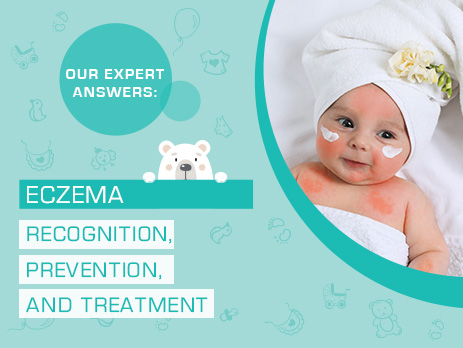Eczema in babies: causes, symptoms, and prevention
IN THIS ARTICLE:
What is eczema?
Genetic predisposition
Symptoms and prevention of eczema
How to treat infant eczema?
What could be the underlying causes?
Eczema is a sterile skin inflammation that develops on a dry skin background. In this video, Dr. Tibor Kovács, a pediatric specialist who graduated from Semmelweis University in 1992 and has extensive experience in child healthcare, explains the factors that can trigger eczema flare-ups.
Eczema, also known as atopic dermatitis, is a sterile skin inflammation that develops on dry skin and presents with red, itchy, and scaly skin symptoms. It can occur at any age but often begins in the early years of childhood. Its development is influenced by skin barrier dysfunction, immune system factors, and environmental triggers.
Atopic dermatitis is more common in children with an atopic constitution, typically seen in fair-skinned, blue-eyed, and light-haired children. Their skin is naturally drier than average, making them more susceptible to factors that worsen skin dryness. Eczema is considered a hereditary condition, meaning if one or both parents have eczema, hay fever, or allergies, their child has a higher risk of developing the same conditions, including eczema.
Symptoms and prevention of eczema
- The most common symptoms of eczema include dry skin, redness, and intense itching.
- Dry skin itself can trigger itching, leading to an inflammatory response that develops quickly and intensely.
- Constant scratching can further damage the skin barrier, increasing the risk of secondary infections, which can make treatment more complicated.
- In such cases, additional treatment strategies may be needed to ensure faster healing.
- For bathing, choose our 3-in-1 Baby Wash & Shampoo Foam, a natural ingredient-based baby cleanser that gently cleanses and hydrates. With five plant extracts and skin-identical lipids, it helps remove cradle cap while soothing and nourishing sensitive baby skin. For skin care, use our Protective Cream, specially developed for the most sensitive baby skin, making it an ideal choice for newborns. Its unique combination of active ingredients deeply moisturizes, strengthens the skin barrier, and quickly soothes redness and irritation.
- Treating eczema is a complex task; regular use of moisturizers rich in natural active ingredients helps reduce skin dryness. If external factors irritate already dry skin (such as winter weather, low humidity, or tight clothing), eczema symptoms may intensify. In severe cases, medical treatment with anti-inflammatory or even steroid-containing creams may be necessary.
- It is not an acute illness that can be cured and then forgotten. Therefore, parents of children with eczema must learn practical methods to prevent the development of eczema symptoms and manage flare-ups effectively.
What could be the underlying cause?
- Parents often worry that food allergies might be behind their child’s eczema. Many assume that eczema is allergy-related, but in reality, only about 10-14% of cases can be scientifically linked to food allergies. Among young children, cow’s milk protein and egg white sensitivities are the most common triggers.
- Diagnosing these allergies is not always straightforward. While skin and blood tests can help detect allergies, a negative result does not completely rule out the possibility that food proteins play a role in triggering symptoms.
- A strict elimination diet is often recommended, meaning the child completely avoids specific foods like cow’s milk protein or egg white. If significant improvement is observed after removing these foods, a link between diet and eczema is suspected, even if laboratory tests were inconclusive.
- Understanding and treating eczema can be challenging. With the guidance of Dr. Tibor Kovács, parents can gain deeper insights into eczema and its treatment options. His expert advice provides valuable support in managing eczema, helping families navigate and effectively combat this persistent skin condition.





